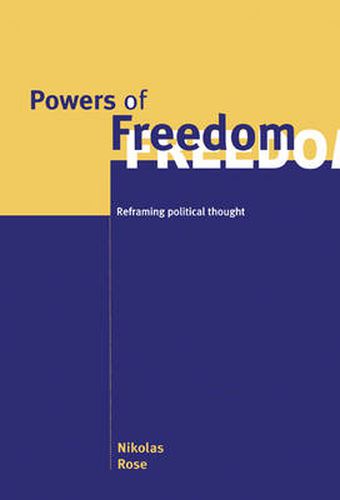Readings Newsletter
Become a Readings Member to make your shopping experience even easier.
Sign in or sign up for free!
You’re not far away from qualifying for FREE standard shipping within Australia
You’ve qualified for FREE standard shipping within Australia
The cart is loading…






Powers of Freedom offers a compelling new approach to the analysis of political power which extends Foucault’s hypotheses on governmentality in new and challenging ways. Nikolas Rose sets out the key characteristics of this approach to political power and analyses the government of conduct in new fields and in new ways. He analyses the role of expertise, the politics of numbers, technologies of economic management and the political uses of space. He illuminates the relation of this approach to contemporary theories of ‘risk society’ and ‘the sociology of governance’. Uniquely, he argues that freedom is not the opposite of government but one of its key inventions and most significant resources. He also seeks some rapprochement between analyses of government and the concerns of critical sociology, cultural studies and Marxism, to establish a basis for the critique of power and its exercise. The book will be of interest to students and scholars in political theory, sociology, social policy and cultural studies.
$9.00 standard shipping within Australia
FREE standard shipping within Australia for orders over $100.00
Express & International shipping calculated at checkout
Powers of Freedom offers a compelling new approach to the analysis of political power which extends Foucault’s hypotheses on governmentality in new and challenging ways. Nikolas Rose sets out the key characteristics of this approach to political power and analyses the government of conduct in new fields and in new ways. He analyses the role of expertise, the politics of numbers, technologies of economic management and the political uses of space. He illuminates the relation of this approach to contemporary theories of ‘risk society’ and ‘the sociology of governance’. Uniquely, he argues that freedom is not the opposite of government but one of its key inventions and most significant resources. He also seeks some rapprochement between analyses of government and the concerns of critical sociology, cultural studies and Marxism, to establish a basis for the critique of power and its exercise. The book will be of interest to students and scholars in political theory, sociology, social policy and cultural studies.